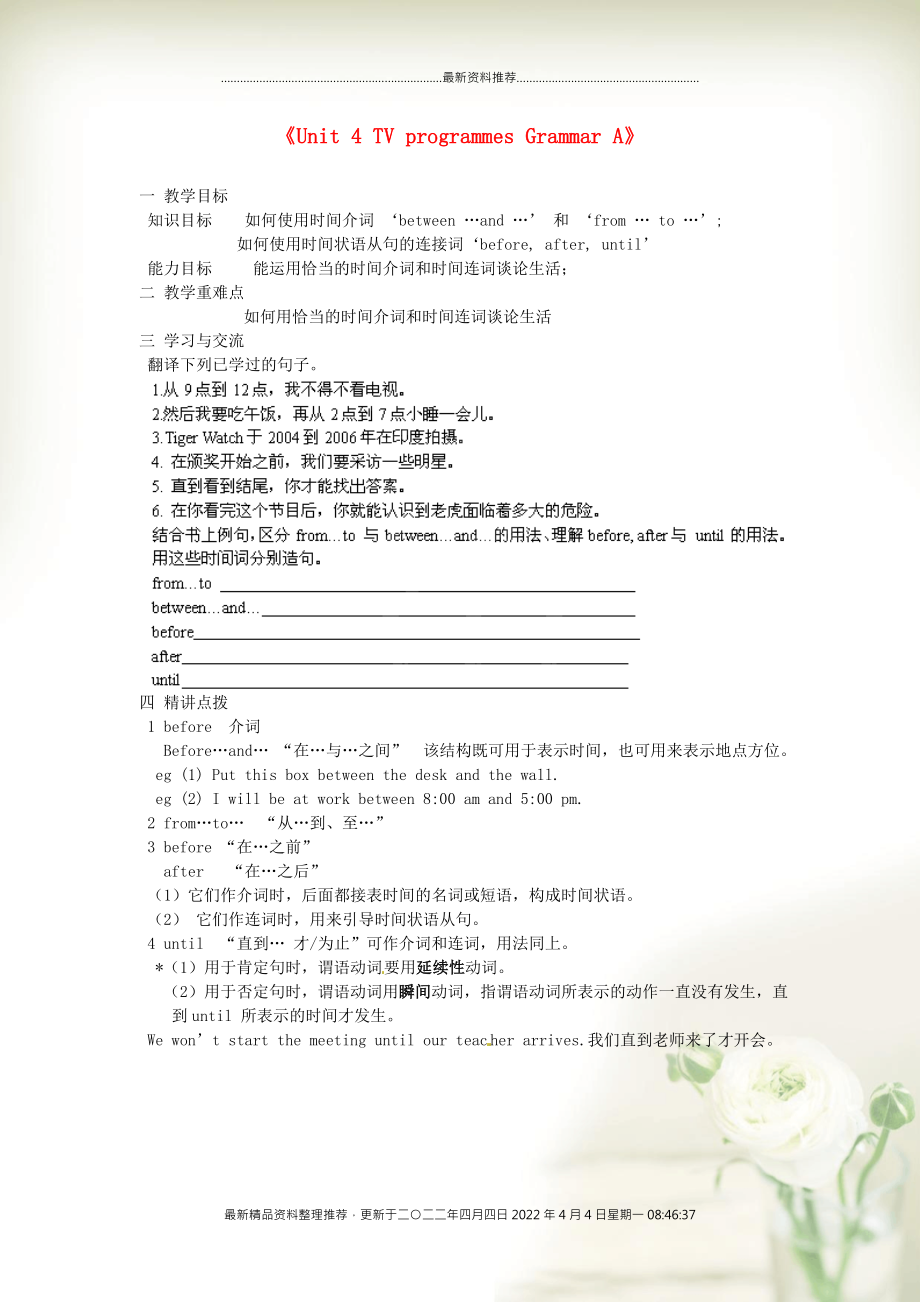《江蘇省漣水縣紅日中學(xué)九年級(jí)英語(yǔ)上冊(cè)《Unit 4 TV programmes Grammar A》教學(xué)案 牛津版》由會(huì)員分享����,可在線閱讀,更多相關(guān)《江蘇省漣水縣紅日中學(xué)九年級(jí)英語(yǔ)上冊(cè)《Unit 4 TV programmes Grammar A》教學(xué)案 牛津版(3頁(yè)珍藏版)》請(qǐng)?jiān)谘b配圖網(wǎng)上搜索����。
1�����、……………………………………………………………最新資料推薦…………………………………………………
《Unit 4 TV programmes Grammar A》
一 教學(xué)目標(biāo)
知識(shí)目標(biāo) 如何使用時(shí)間介詞 ‘between …and …’ 和 ‘from … to …’;
如何使用時(shí)間狀語(yǔ)從句的連接詞‘before, after, until’
能力目標(biāo) 能運(yùn)用恰當(dāng)?shù)臅r(shí)間介詞和時(shí)間連詞談?wù)撋睿?
二 教學(xué)重難點(diǎn)
如何用恰當(dāng)?shù)臅r(shí)間介詞和時(shí)間連詞談?wù)撋?
三 學(xué)習(xí)與交流
翻譯下列已學(xué)過(guò)的句子���。
四 精講點(diǎn)撥
1 before 介詞
Before…
2����、and… “在…與…之間” 該結(jié)構(gòu)既可用于表示時(shí)間��,也可用來(lái)表示地點(diǎn)方位���。
eg (1) Put this box between the desk and the wall.
eg (2) I will be at work between 8:00 am and 5:00 pm.
2 from…to… “從…到��、至…”
3 before “在…之前”
after “在…之后”
(1)它們作介詞時(shí)���,后面都接表時(shí)間的名詞或短語(yǔ),構(gòu)成時(shí)間狀語(yǔ)���。
(2) 它們作連詞時(shí)��,用來(lái)引導(dǎo)時(shí)間狀語(yǔ)從句�。
4 until “直到… 才/為止”可作介詞和連詞,用法同上����。
3、
*(1)用于肯定句時(shí)����,謂語(yǔ)動(dòng)詞要用延續(xù)性動(dòng)詞。
(2)用于否定句時(shí)��,謂語(yǔ)動(dòng)詞用瞬間動(dòng)詞����,指謂語(yǔ)動(dòng)詞所表示的動(dòng)作一直沒(méi)有發(fā)生,直到until 所表示的時(shí)間才發(fā)生����。
We won’t start the meeting until our teacher arrives.我們直到老師來(lái)了才開(kāi)會(huì)。
五 達(dá)標(biāo)檢測(cè)
選詞填空
from… to between…and before when if after until
1. I won’t go to bed _____ my mother comes back.
2
4�����、. He could swim ______he was five years old.
3. You may come to my office ________ 9:00 a.m. ____ 11:30 a.m. tomorrow.
4. We go to school _____ Monday ___ Saturday.
5. Tom will go skating with us __ he has time.
英漢互譯
1.全世界 2.新聞?wù)?
3.天氣預(yù)報(bào)
5、 4.洗淋浴
5.中國(guó)少年 6.戲劇俱樂(lè)部
翻譯下列句子
1. 我沒(méi)有時(shí)間每天晚上坐在電視機(jī)前幾個(gè)小時(shí)�����。
I___________________________________the TV for hours every night.
2. 女孩喜歡在午餐和晚餐之間吃零食����。
The girls like to eat snacks_______________________________.
3. 我們從星期一到星期五上學(xué)����。
6、
We go to school______________________________________.
4. Tom將在明天早上5點(diǎn)至6點(diǎn)之間回來(lái)
Tom__________________________5a.m____________6a.m tomorrow.
5. 他在過(guò)馬路前向兩邊看了看�����。
II.閱讀短文���,根據(jù)其內(nèi)容完成句子�����。
Do you wonder why your classmates always get higher marks than you?
If you think it is because they're cleverer
7���、 than you, you're wrong, according to American authors Wood Smethurst and William Luckie.
In their book, "Study Power", they say that successful students are not cleverer than others, they just know the best ways to study for exams.
The best way to study, say the authors, is to study actively.
8�、 To study actively, you must ask yourself questions as you work. If you are studying Mao Zedong, for example, you could ask yourself to write down everything good that he did for China. Asking yourself questions like that will help you think better and faster. It'll also help you remember informatio
9���、n during exams. The authors say students should think of questions like “fishing hooks (魚鉤)”. Questions "hook" on your memory and help you do better in exams.
To study better you also need to make the best use of your time. When you study, the authors say, only do so for 20 minutes at a time. If
10�����、 you study for longer, you will start thinking about other things and not learn anything.
The authors also tell students to listen to everything their teachers say in class and write down.
The authors say that everyone can get top marks if they learn actively and follow their tips.
Try
11�����、them today and find out!
1. The book "Study power" is written by two authors ______________________
from___________.
2. To study better, say the authors, you need to _________________________
and ______________________.
3.__________________ like that will help you think better and faster, it'l
12���、l also help you __________________during exams.
4. The authors suggest that we can only _______________________.
5. The writer asks the readers to find out whether ____________________ if they
learn actively and follow these tips.
六 教學(xué)反饋
最新精品資料整理推薦,更新于二〇二二年四月四日2022年4月4日星期一08:46:37
 江蘇省漣水縣紅日中學(xué)九年級(jí)英語(yǔ)上冊(cè)《Unit 4 TV programmes Grammar A》教學(xué)案 牛津版
江蘇省漣水縣紅日中學(xué)九年級(jí)英語(yǔ)上冊(cè)《Unit 4 TV programmes Grammar A》教學(xué)案 牛津版

